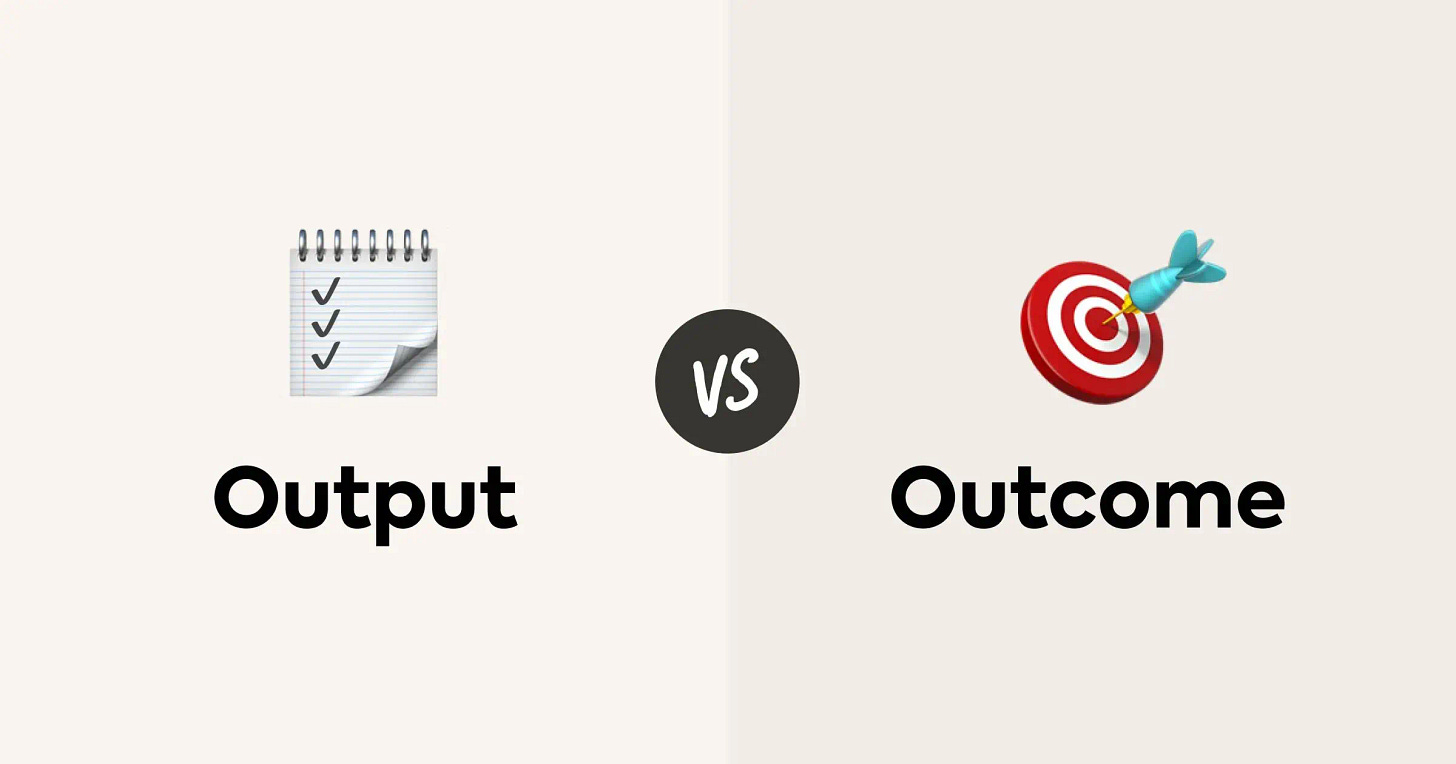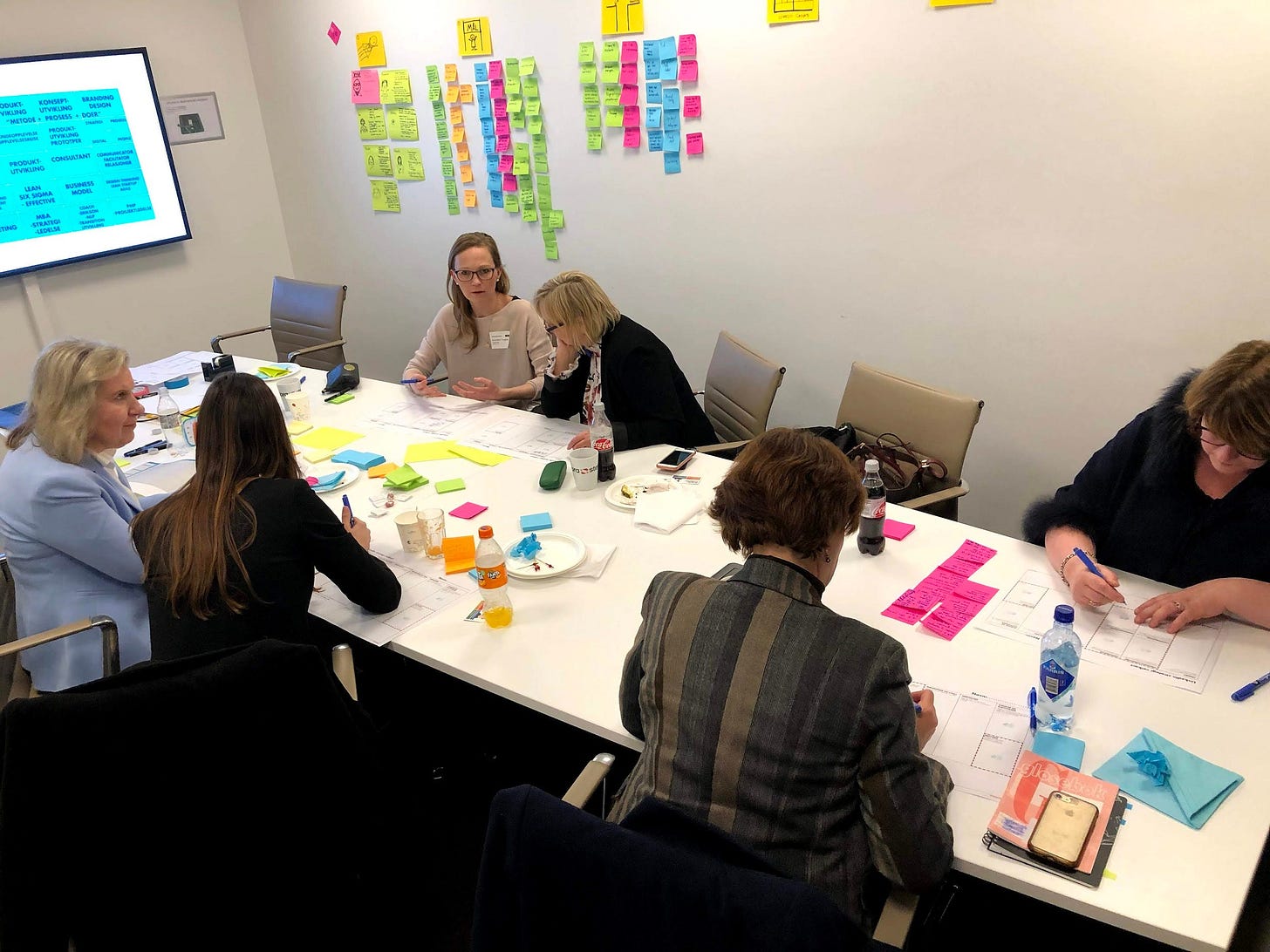Outputs vs. Outcomes: Why the Difference Matters
How to Design and Facilitate Workshops on Focusing on Outcomes

In service design and innovation, the distinction between outputs and outcomes is crucial. Yet, many teams still conflate the two, leading to misplaced priorities and missed opportunities for real impact. Understanding the difference can shift how we design, measure success, and ultimately create value for people and society.
What Are Outputs?
Outputs are the tangible deliverables of a project or initiative. They are the things we produce—documents, prototypes, reports, new digital services, training programs, or policy changes. Outputs are often easy to measure because they are concrete and immediate.
Examples of Outputs
A municipality launches a new citizen portal for applying for social benefits.
A service team develops a toolkit for frontline employees to improve interactions with residents.
An organization hosts a series of workshops to teach innovation methods.
These are all important but not necessarily impactful on their own. That’s where outcomes come in.
What Are Outcomes?
Outcomes are the real-world effects of those outputs. They measure whether our work leads to meaningful change—improved experiences, increased efficiency, higher engagement, or better quality of life. Outcomes are often harder to measure because they require looking at behaviors, perceptions, and long-term shifts.
Examples of Outcomes
The citizen portal reduces application time by 50%, making it easier for people to access benefits when they need them.
Frontline employees feel more confident and empowered in their interactions, leading to fewer complaints and higher satisfaction.
Workshop participants apply innovation methods in their daily work, leading to new service improvements.
While outputs focus on what we create, outcomes focus on why it matters.
Why This Distinction Matters
1. Outputs Don’t Guarantee Outcomes
Just because we build something doesn’t mean it will be used effectively or create the change we intended. A digital service can launch but still be confusing. A training program can be delivered but not lead to new behaviors.
2. Measuring the Wrong Thing Can Lead to the Wrong Priorities
If success is measured by outputs alone (e.g., number of workshops held, reports written), teams might prioritize completion over impact. This can create a false sense of progress while real problems remain unsolved.
3. Outcomes Require a Broader Perspective
Focusing on outcomes forces us to think beyond our immediate deliverables. It requires engaging with users, testing assumptions, and iterating based on feedback to ensure real-world relevance.
How to Shift from an Output to an Outcome Mindset
Define Success in Terms of Impact – Before starting a project, ask: What change do we want to see? How will we know if we’ve achieved it?
Measure What Matters – Go beyond counting deliverables; look at adoption rates, satisfaction levels, or efficiency gains.
Stay Connected to Users – Outcomes emerge from real people’s experiences. Continuous engagement, feedback, and iteration ensure our work translates into meaningful improvements.
Facilitation, Workshop Design, and the Shift from Outputs to Outcomes
Facilitation and workshop design are powerful tools for driving change, but their true impact depends on focusing on outcomes, not just outputs. Many workshops generate ideas, reports, or action plans—these are valuable outputs, but without a clear link to real-world change, they risk becoming just another set of documents collecting dust.
How Outputs vs. Outcomes Relate to Facilitation and Workshop Design
Workshops Are Often Designed Around Outputs
A common workshop output is a set of insights, a roadmap, or a new service concept.
While these are useful, they don’t automatically lead to action or impact.
True Value Comes from Outcomes
The success of a workshop isn’t measured by how many post-its were used but by the powerful conversations they sparked and what happens after those conversations.
Outcomes could include real behavior change, improved collaboration, or the successful implementation of ideas.
Practical Ways to Focus on Outcomes in Facilitation
Start with the End in Mind
Before designing a workshop, ask: What change do we want to see?
Define success beyond the workshop room—what should participants do differently afterward?
Make Follow-Through Part of the Design
Plan for post-workshop engagement (check-ins, prototypes, testing).
Assign ownership and next steps before participants leave.
Facilitate for Action, Not Just Discussion
Move beyond brainstorming—integrate testing, quick wins, and small experiments.
Use real scenarios and challenges rather than abstract exercises.
Measure the Impact Over Time
Check if workshop outcomes translate into real changes in behavior, processes, or service improvements.
Ask: Did this session lead to tangible improvements, or was it just a productive conversation?
Final Thoughts
Workshops and facilitation should be catalysts for change, not just idea-generation sessions. By focusing on outcomes, we ensure that our efforts lead to meaningful improvements, not just another collection of sticky notes.
Have you seen workshops that produced great outputs but failed to drive real change? What made the difference?
PS) Exciting Changes Ahead at Facili-station!
Thank you for being part of this journey! Starting in April, Facili-station's content will be available exclusively to paid subscribers. For just $100 per year—less than the cost of a couple of Starbucks coffees each month—you’ll not only access premium facilitation and innovation insights but also receive free coaching, mentoring, and be part of an exclusive professional community.
Your support keeps this platform thriving, and I’d love for you to be part of this next chapter. Join us and continue growing with Facili-station!
— José Manuel Redondo Lopera
I hope this post, made sense and you found it useful.
If “HELL YEAH!”, please like it and share it in social media so more people can get can also benefit from it :-)
I would also appreciate if you subscribe, and give some comments here if you wonder something and want to give me some feedback. I would love to read your input here!
If you have a Substack yourself and like my content, I would love for you to recommend “Facili-station” to your subscribers.
Have a nice one!!
If you need a workshop designer and facilitator or a trainer to teach your team on how do this, please contact me at jose@facilistation.com
As a workshop designer and facilitator
I can help teams make faster and better decisions.
I can help teams solve problems faster and more cost efficient.
I can ensure actionable outcomes.
Facilitated meetings have less conflict, more engagement and ownership.
My workshops are designed to provide the structure required to quickly align and move forward with a plan or idea so you can reclaim time, energy and headspace.



Very cleverly put. I've been a long time champion of the outcomes based approach to education and glad to see it so clearly laid out here. I'm new to Substack and would appreciate connecting in the learning and development space. I'm at learndevelopgrow.substack.com